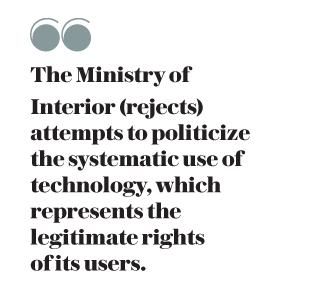JEDDAH: Absher, the “one-click” e-services app launched by the Interior Ministry in 2015, is now regarded as the leading government platform for Saudi citizens, freeing them from bureaucratic inefficiency and endless queuing for everyday services.
However, in a recent New York Times article, the app was criticized as a “tool of repression” following claims by Democratic Senator Ron Wyden and women’s rights groups.
Apple and Google were urged to remove the application from their devices over claims that it “enables abhorrent surveillance and control of women.”
In an official statement, the ministry rejected the allegations and said the Absher platform centralized more than 160 different services for all members of society, including women, the elderly and people with special needs.
The app makes electronic government services available for beneficiaries to access directly at any time and from any place in the Kingdom, the ministry said.
Absher allows residents of the Kingdom to make appointments, renew IDs, passports, driver’s licenses, car registration and other services with one click.
Many Saudis still recall having to queue at government agencies, such as passport control offices and civil affairs departments, for a variety of official procedures. Appointments could take weeks to arrange, with people relying on their green files, or “malaf allagi” — the 1980s and 1990s paper form of Absher that was known as the citizen’s “lifeline,” both figuratively and literally.
Hours would be spent as government departments ferried files back and forth, and if a form was lost, the whole transaction process would have to start again. As complicated as it was for men, women suffered more.
Muna Abu Sulayman, an award-winning strategy adviser and media personality, told Arab News the introduction of Absher had helped strengthen women’s rights.
Sulayman said she was disappointed at comments on the e-services platform being made abroad. “There are consequences that people don’t understand. It’s a very idealistic and naive way of understanding what is going on,” she said.
“The discussion on the guardianship law is internal and ongoing — it is something that has to be decided by our society and not as a result of outside pressure. We’re making strides toward equality and Absher is a step in the right direction,” she said.
“In a Twitter survey, I asked how many women have access to their guardian’s Absher. Most answered that they control their own fate. Men who don’t believe in controlling women gave them access to their Absher and that shows an increase in the participation of women in their own decision-making.”
Absher also provides services such as e-forms, dealing with Hajj eligibility, passport control, civil affairs, public services, traffic control, and medical appointments at government hospitals.
The platform is available to all men and women, and removes much of the bureaucracy and time wasting associated with nonautomated administrative systems.
On the issue of granting women travel permits, the law requires a male guardian to grant it through the portal, as well as for men under the age of 21.
Retired King Abdullah University professor Dr. Zainab M. Zain told Arab News: “I always had issues with my passport renewal as well as my children’s as they are both non-Saudi. For years it was risky not to follow up properly at passport control — you never knew what could happen, but now I can renew their permits by paying their fees online through Absher from the comfort of my home in Abu Dhabi.”
Ehsanul Haque, a Pakistani engineer who has lived in the Kingdom for more than 30 years, said: “Absher has helped tremendously with requests, such as exit and entry visas for my family and myself. I can receive approval within an hour whereas once it would’ve taken me days,” he said.
“The platform has eased many of my troubles.”
The Absher website also provides information on how to report wanted persons, or administrative or financial corruption.
In April, 2018, the ministry launched “Absher Business,” a technical initiative to transfer its business services to an interactive digital system.
With an annual fee of SR2,000 ($533), business owners such as Marwan Bukhary, owner of Gold Sushi Club Restaurant in Jeddah, used the portal to help manage his workers’ needs in his expanding business.
“There are many features in Absher that helps both individual and establishment owners,” he said. “I took advantage of the great features it provided, and it saved me a lot of time and trouble and also my restaurant workers. It’s a dramatic change. When Absher Business was launched last year, it organized how I needed to manage my workers’ work permits.
“Through the system, I could see the status of all my employees, renew their permits, grant their exit and entry visas, and have their permits delivered to my house or my business through the post after paying the fees. It saved business owners a lot of time and energy.
“I used to have to do everything manually myself or have my courier help. I believe it’s the government’s most advanced system yet with more features being added every now and then,” Bukhary said.
“Absher has eased our burden, unlike the old days when we needed to visit government offices and it would take four weeks just to get an appointment. One click is all it takes now.”
How ‘Absher’ app liberates Saudis from government bureaucracy
How ‘Absher’ app liberates Saudis from government bureaucracy

- Western media mistaken in portraying app as a tool of repression, leading female journalist says
Klija Festival in Buraidah empowers small businesses

- Half a million attend 15-day celebration of heritage; event creates 1,500 seasonal jobs
RIYADH: The 17th Klija Festival in Buraidah drew more than half a million visitors during its 15-day run, celebrating the region’s heritage and entrepreneurial spirit.
Organized by the Qassim Chamber of Commerce, the event highlighted small businesses, providing a platform for entrepreneurs to showcase local products.
More than 340 sales outlets, marketing corners and points of sale welcomed attendees, while the festival provided 1,500 seasonal job opportunities, the Saudi Press Agency reported.
The small business pavilions featured families in the cottage industry, artisans and startups presenting traditional foods, and handicrafts and heritage items that reflect the region’s identity.
Participants said that the festival was a key marketing platform, boosting sales, increasing brand awareness, facilitating knowledge exchange and fostering connections with organizations supporting SMEs.
Mohammed Al-Hanaya, Qassim Chamber secretary-general and festival supervisor, said that the event brought together families, artisans, SMEs, companies and institutions, stimulating commercial activity, opening direct marketing channels and enhancing economic returns.
He added that the festival provided seasonal jobs for more than 1,500 young men and women across operations, marketing and services, supporting the labor market, empowering national talent, and connecting youth to the events and creative economy.
Klija, a traditional cookie made from wheat flour, dates or sugar, date syrup and natural ingredients such as cardamom and lemon, is a rich source of energy, carbohydrates, dietary fiber and natural proteins.
A cultural icon rooted in Qassim’s traditions, the cookie has gained international exposure through the festival, expanding the availability of packaged products.
Starting next year, the festival will be renamed the International Klija Festival, a rebranding approved by Qassim Gov. Prince Faisal bin Mishaal, who described it as a “successful model for turning local initiatives into global economic engines.”
This year’s festival, held at the King Khalid Cultural Center, included international participants from Egypt, Turkiye and Morocco, marking its evolution into a cross-cultural platform.













